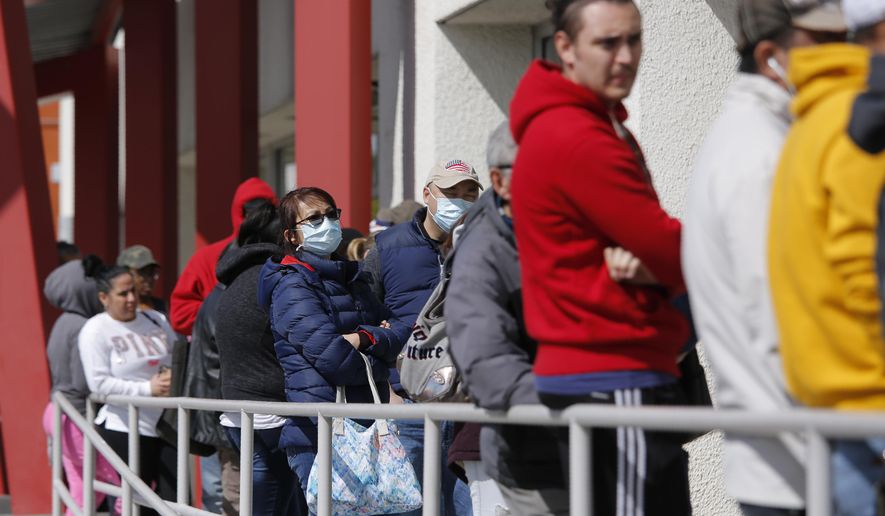They may be raking in the cash from Uncle Sam now, but those collecting enhanced unemployment benefits during the COVID-19 pandemic will be in for a massive shock at the end of the year when they realize they have to pay taxes on that income, the IRS warned this week.
Millions of people who have never collected unemployment benefits before got checks this spring and summer, in some cases reaching more than $1,000 a week — far exceeding what some of them made in their jobs.
But the cash comes with strings. The IRS said unemployment benefits count as taxable income.
Because taxes aren’t automatically withheld, the way they would be from a paycheck, those who collect unemployment benefits are liable to face unexpected bills at the end of the year, the agency said.
“By law, unemployment compensation is taxable and must be reported on a 2020 federal income tax return,” the tax agency said in a memo issued Tuesday.
The warning was issued as Congress debated whether to keep the enhanced unemployment benefits flowing.
As the pandemic hit, Capitol Hill approved an unheard-off $600-a-week federal benefit, added to whatever states already pay in unemployment insurance benefits.
Some states pay a couple hundred dollars a week while a few pay a maximum of more than $700. Massachusetts tops the list at a maximum of more than $800 a week, meaning that, combined with the federal plus-up, a jobless person in that state could rake in more than $1,400 a week, which works out to an annual salary rate of more than $72,000.
That’s a massive raise for some, and it makes the hefty tax bill they could face at the end of this year all the more tricky.
“There’s going to be a big crunch,” said Ross Marchand, vice president of policy at the Taxpayers Protection Alliance.
Making matters worse, if the amount they owe is too high, they might also pay a penalty for not having paid estimated taxes during the year, Mr. Marchand said.
Adding to the confusion, the coronavirus stimulus checks that went out several months ago are not taxable income, said Joe Bishop-Henchman, vice president of policy at the National Taxpayers Union. Unemployment benefits are — but are subject only to income tax, not the payroll tax.
The IRS says those collecting benefits can sign up to have money withheld so they don’t face an unexpected bill later, but it’s not clear how many people are doing that.
IRS officials didn’t respond to a request for more information.
Taxpayer groups said the agency’s warning memo is welcome but is not enough. They said more needs to be done to make sure those affected are aware.
“They need to communicate better, and they need to make sure people know what they’re getting into when they receive unemployment insurance,” Mr. Marchand said.
Added Mr. Bishop-Henchman: “It really should be on every check they send out, every payment — a reminder that this is taxable.”
Congress could also come back later and waive the taxes. In 2009, when lawmakers boosted federal unemployment benefits during the Great Recession, they waived some tax, Mr. Bishop-Henchman said.
So far, though, there has been no concerted move to provide relief.
That could still come.
Congress has been attempting to write another round of coronavirus relief, and what to do with unemployment benefits is a major hurdle.
The expanded federal assistance expired at the end of July, and Democrats and most Republicans say an extension is warranted. But they disagree on the level.
Democrats want to continue at $600 a week, figuring the generosity will prevent people from rushing back into the labor force and spreading the virus.
Republicans say $600 is too much. They point to data from economists who say most unemployed people were getting more money with the enhanced federal benefits than they did from their paychecks from work. Employers have told horror stories of being unable to find workers, or even to rehire their own former employees, who say they make more at home than they did on the job.
Unable to reach a deal, lawmakers fled Capitol Hill earlier this month.
House Speaker Nancy Pelosi, California Democrat, is calling the House back this week to pass a bill to give $25 billion to the U.S. Postal Service to cover its massive financial problems. On Wednesday, a group of Democrats begged Mrs. Pelosi to add an unemployment benefits bill to the agenda.
The New Democrat Coalition wants the House to pass a bill that would automatically extend the $600-a-week payments as long as the economy is struggling.
“Since the $600 supplement has expired, countless constituents have reached out to our offices, expressing heartbreaking stories, in which they must choose between paying for groceries or their car payment,” the lawmakers wrote.
President Trump has acted unilaterally by issuing a memo offering federal money to states that want to pay extra benefits, though only at a $300-a-week level.
Some Republican-led states have signaled that they will take the offer, though Democratic governors have been slower to accept.
A senior administration official told reporters aboard Air Force One on Tuesday that there is room to negotiate a new round of coronavirus relief.
The official said they should be able to reach agreement on a new round of payments to businesses to keep their payrolls intact, and on money to help schools reopen.
The official put the price tag at about $500 billion. That would rule out Mrs. Pelosi’s demands for $1 trillion to be sent directly to states and localities, the official said.
• Stephen Dinan can be reached at sdinan@washingtontimes.com.
• Gabriella Muñoz can be reached at gmunoz@washingtontimes.com.




Please read our comment policy before commenting.